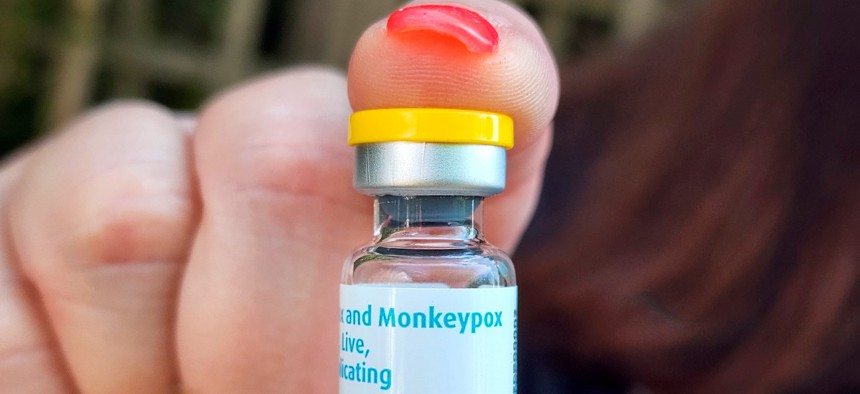
A vial of the Monkeypox vaccine is displayed by a medical professional at vaccination site at the Northwell Health offices at Cherry Grove on Fire Island, New York on July 13, 2022. James Carbone/Newsday RM/Getty Images
The CDC Expects More Monkeypox Cases, But Says Testing and Vaccine Stores Are Increasing
As of July 14, there have been 1,470 reported cases in the United States across 44 jurisdictions.
Federal public health officials expect to see monkeypox cases continue to increase, but argue they are concurrently ramping up testing and vaccine availability amid some pushback and scrutiny of their response.
The current monkeypox outbreak started in May and as of July 14, there have been over 11,000 reported cases globally in 65 countries and 1,470 in the United States across 44 jurisdictions. Among the 700 U.S. cases for which the government has demographic information, the median age is 36, and the vast majority of cases are among men who have sex with men. Recently, the federal government has faced criticism from a top Republican senator and others that it is repeating mistakes it made early on with COVID in its response to monkeypox, along with pressing demands for more vaccines from areas such as New York City, which has become an epicenter for the virus, and calls to free thousands of the U.S.-owned vaccines in Denmark.
“As we closely monitor cases I would like you to all understand that we anticipate an increase in cases in the coming weeks,” Dr. Rochelle Walensky, director of the Centers for Disease Control and Prevention, said during a Friday. The CDC has streamlined the reporting process for states, making it easier to report the data, and with more cases in the United States, they expect exposure to increase. Also, the agency has “significantly” expanded the number of people as well as specimens getting tested.
The Health and Human Services Department announced on Friday it has ordered another 2.5 million doses of the JYNNEOS vaccine, which combined with previous orders, will bring the federal government’s available supply of the vaccine to nearly seven million doses by mid-2023.
As of Thursday, the federal government has distributed about 156,000 doses nationwide and now is making an additional 131,000 doses available for delivery as early as Monday, said Dawn O’Connell, HHS assistant secretary for preparedness and response. “While the supply of JYNNEOS vaccines has been limited in recent weeks, we are starting to see supply increase and as it does we are going to continue getting those doses out as quickly, efficiently and equitably as possible,” she said.
States can also request the ACAM2000 vaccine (which could potentially have serious side effects) and some have in “relatively modest quantities,” said O’Connell.
The federal government is now prioritizing giving vaccines to areas with increasing case numbers while still providing to areas with individuals at increased risk, Walensky said. She called on states and jurisdictions to “quickly and accurately report all of their cases through CDC’s recommended reporting system.”
Additionally, thousands of more U.S.-owned vaccine doses being stored at a Danish vaccine plant could soon be made available now that the FDA has completed its on-the-ground inspection. “Doses from the facility can potentially be approved by the end of July, which would mean that approximately 780,000 additional doses would be added to the government’s available supply,” said a press release from the Health and Human Services Department on Friday.
In order to clear up one of the “points of confusion” out there, Walensky said, “we have the testing capacity needed.” Over the past week, the CDC has announced four commercial labs that can now do monkeypox testing along with CDC’s network: the Mayo Clinic, Quest Diagnostics, and LabCorp. The country has gone from being able to test 6,000 samples per week to 70,000 samples per week, Walensky said.







